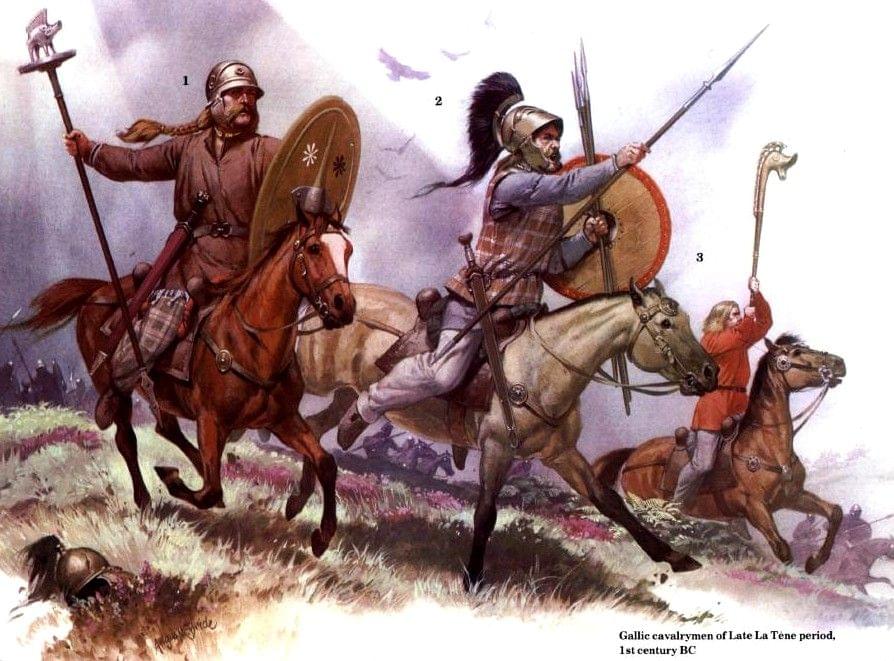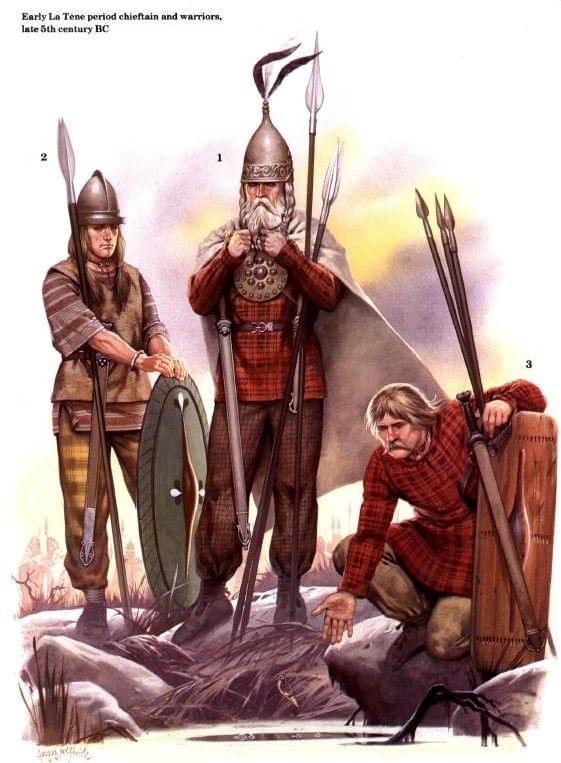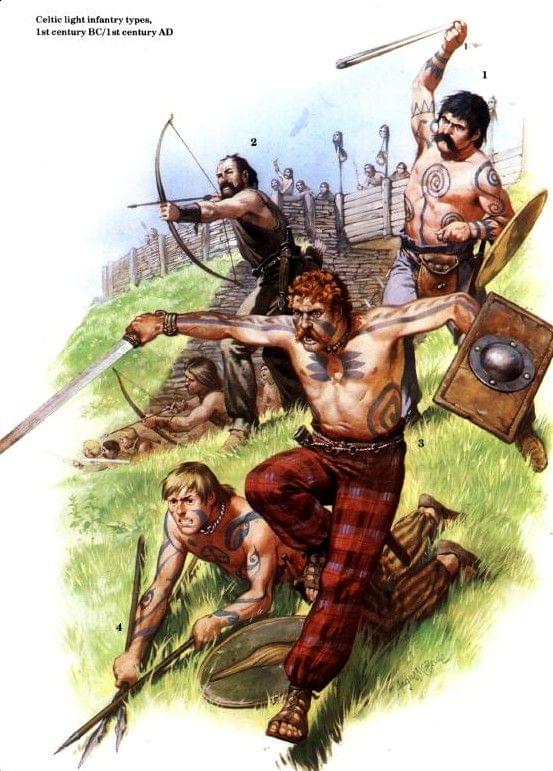Forgotten Celtic tribes part 3
Helvetii
Julius Caesar stated that the Celts who lived nearest to the Rhine waged continual war against the German tribes on the other side. That continuing war made them much tougher and resilient than other tribes. Helvetii were surrounded by enemies. With the Rhine frontier to the north, the Jura Mountains separate them from the Sequani to the west, and Lake Geneva and the Rhone separating them from the Allobroges to the south. So they either had to fight or migrate. They tried the latter in 61 BC, but the Romans were already influential enough in Gaul to stop them.
Around 60 BC the Helvetii are coming under greater pressure from migrating Germanic tribes who have now arrived at their north and are occupying territory on the east bank of the Rhine. They plan to migrate into the lowlands to the west, but their proposed path will take them through the territory of the Aeduii, a Roman ally, and the tribes that lie in the way fear that the Helvetii will plunder and destroy as they go. After some skirmishing, the Helvetii and the Romans face each other at the Battle of Bibracte in 58 BC, just outside the Aeduii oppidum of the same name. The Helvetii are mercilessly crushed by the six Roman legions. Perhaps two-thirds of their number, men, women, and children, are killed on the day, while another 20,000 are killed in the subsequent pursuit.
The last time we heard about them was in 69 AD. Galba and Aulus Vitellius started a fight for Nero's successor on a Roman throne. On 16 April 69 AD, the Vitellians defeated the army of Otho (Galba was assassinated) near Cremona. Otho commits suicide and the Senate sends its congratulations to Vitellius. Important for our story is that Helvetii are also crushed by the forces of Vitellius. Their capital at Aventicum surrendered and the tribe is apparently only saved from being wiped out by the intervention of the Helvetian envoy to Vitellis, Claudius Cossos. The name of the Helvetii is preserved in the later native name for Switzerland, Helvetia.

Scordisci
The Scordisci were a major tribal confederation that, by the middle of the first century BC, was occupying much of today's Serbia. They migrated into the Balkans during the third century. Not much is known about their origins. Many local cultures had the influence on them (Dacians, Illyrians, and Thracians). According to Roman propaganda (penned by Ammianus Marcellinus), they were accustomed to offering up their prisoners to Bellona and Mars, and drinking blood from the skulls of the murdered prisoners.
In 146 BC the four client Greek republics are dissolved and Macedonia officially becomes the Roman province of Macedonia. This means Rome can shift its focus to conquering Balkan. Some five years later Romans launch their first attack. The Scordisci surprisingly manage to repulse the attack and launch a counter-attack on Macedonia. This transfers into a stalemate. In the years to come, Romans tried many times to defeat them. The most serious attack was, according to Livy, in 135 BC by Praetor Marcus Cosconius. In 88 BC Scordisci and their allies swept through northern Greece and destroyed many monuments including a temple of Zeus. In the next few years, Sula and Cornelius Scipio responded to this provocation with decisive campaigns in Balkan. Constant war with Rome and increasing pressure from their neighbors took its toll on Scordisci. Despite the sudden attack on Macedonia by the Scordisci in 16 BC, the Scordisci finally appear to submit to Roman control. Now they are granted a level of local autonomy. As the new century opens, the Scordisci territories are included into the Roman provinces of Pannonia, Moesia, and Dacia.

Iceni
Iceni are the most famous for their queen Boudica and her uprising against the Romans. They were a Celtic tribe based in what is now Norfolk, north-western Suffolk, and eastern Cambridgeshire. Iceni are ancient tribe linked to the La Tène period in Europe according to works of Hawkes (1931) and Childe (1940). In his second expedition, Caesar encountered a tribe known as the Cenimagi. Their name can be translated as ''Great Iceni''. It seems that Iceni welcome the Romans under Governor Aulus Plautius around 44AD.
The good relationship with Romans didn't last. The second Roman Governor of Britannia, Publius Ostorius Scapula, tries to disarm the Iceni, but his heavy-handed tactics cause a serious uprising. Uprising was distinguished but hostilities continue to rise. Romans begin to ignore the terms of the Iceni's client-statehood. Romans demand that the Iceni king gives half of his properties and killed him when he refused.
This horrible act made Boudicca a leader of Iceni. She created a powerful Celtic uprising in 60 AD involving the Iceni, the Trinovantes, and other smaller tribes. They acted quickly by sacking and burning Camulodunum (Colchester), Londinium, and Verulamium. Roman Governor Gaius Suetonius Paulinus meets this powerful Celts army somewhere along Watling Street. Despite being tired after their battle against Deceangli and their opponent having big numerical disadvantage Romans prevailed. Celts are massacred and the rebellion is defeated. Boudicca's fate is unknown, but it is presumed that she committed suicide rather than allowed herself to fall into Roman hands. To completely pacify the Iceni the Roman city of Venta Icenorum is built. It is located at modern Castor St. Edmund immediately south of Norwich.

Pictures were taken from Pinterest
Hi. I am @greetbot - a bot that uses AI to look for newbies who write good content.

I found your post and decided to help you get noticed.
I will pay a resteeming service to resteem your post,
and I'll give you my stamp of automatic approval!
Resteemed by @resteembot! Good Luck!
The resteem was payed by @greetbot
Curious?
The @resteembot's introduction post
Get more from @resteembot with the #resteembotsentme initiative
Check out the great posts I already resteemed.